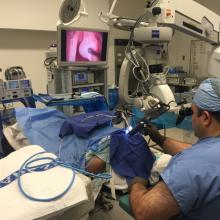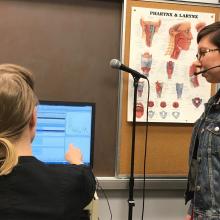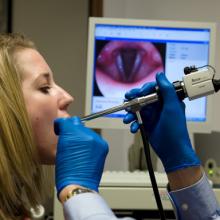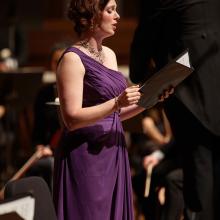Professional singers study repertoire, diction, phrasing and dynamics, but how many also study ways to ensure the long-term health and vitality of their voices?
At the University of Washington, Kari Ragan of the UW School of Music Voice faculty, a certified singing voice specialist, has been engaged in collaborative research in vocal health with faculty members and clinicians from the University’s School of Music, Otolaryngology, and Speech and Hearing Sciences departments.
They, along with scholars, musicians and practitioners from around the country, will gather at the University of Washington this spring to explore research and discussion related to the care of the performing voice.
The Art and Science of the Performing Voice, a two-day conference set for April 21 and 22 at the UW, unites scholars and practitioners focused on the integration of art, science, and medicine in the study and health management of the singing voice.
The conference is organized by a group of University of Washington faculty members and clinical providers from the departments of Speech & Hearing Sciences, Laryngology Division within Otolaryngology, and the School of Music. Lead faculty members involved in the group include Ragan (School of Music), Martin Nevdahl (UW Speech and Hearing Sciences), and Al Merati (UW Otolaryngology).
Symposium highlights include talks and sessions led by scholars and practitioners from around the country. Keynote speakers for the conference are Michael Johns, MD, otolaryngologist and director of the USC Voice Center at the University of Southern California, Melissa Cross, singing teacher and creator of “The Zen of Screaming” instructional video, and Leda Scearce, MM, MS, singing voice specialist and Director of Performing Voice Programs and Development at Duke Voice Care Center. Johns’ talk, “Do I Have to Sound so Old?: Evaluation and Management of the Aging Performer” will discuss the effects of aging on the performing voice and present current research regarding the assessment and treatment of age-related voice issues. Cross’s talk, “MAL CANTO: Servicing the Needs of a New Bree of Non-Classical Vocalists” will discuss the vocal demands of the non-classical singer and will present information about how she teaches these singers to produce “deviant” sounds without injuring the voice. Scearce will present “You Can’t Tap Dance in Pointe Shoes: Considerations for Technique and Treatment for Classical and Contemporary Singing Styles”.
A full schedule of events and speakers as well as more detail about the symposium, can be found here.



